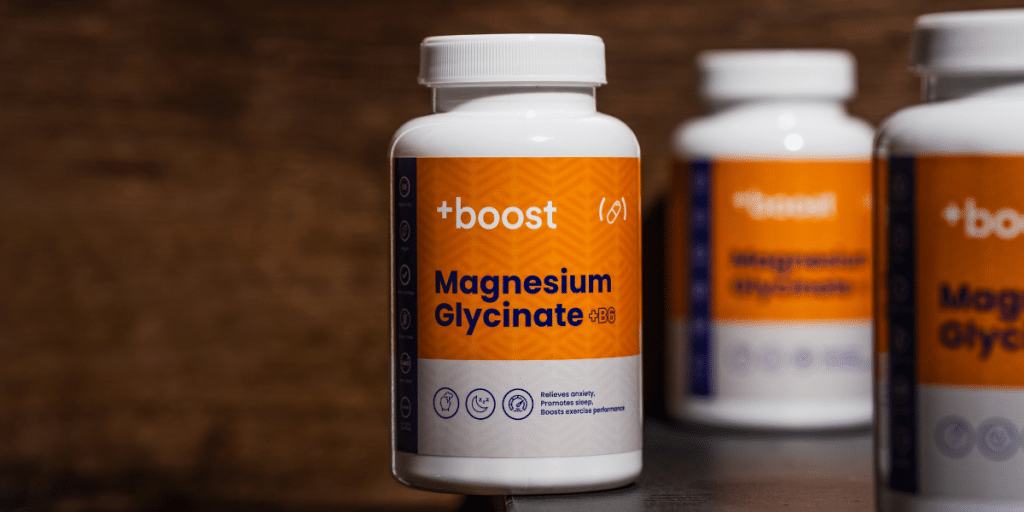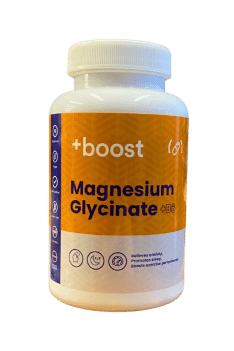Sleep is a crucial component of a healthy lifestyle, yet many of us struggle to get the recommended 7-9 hours of restful sleep every night. Apart from feeling tired throughout the day, sleeping disorders can significantly impact our physical and mental health, from fatigue and irritability to more severe conditions such as depression. While many factors can affect our ability to fall and stay asleep, one important factor could be magnesium deficiency. In this blog, we will explore the benefits of Magnesium Glycinate as a sleep aid and how you can incorporate it into your evening routine for better overall health and well-being.

Reasons why you can’t fall asleep
Have you ever experienced a restless night, tossing and turning in your bed, trying to fall asleep? You’re definitely not alone. Numerous factors can impact our ability to fall asleep and stay asleep.
Stress and anxiety
One common reason is stress and anxiety, which can lead to racing thoughts and heightened alertness, making it difficult to relax and unwind.
Electronic devices before bed
Another factor is exposure to blue light from electronic devices before bed, which can interfere with our natural sleep-wake cycle by suppressing melatonin production.
Lifestyle factors
There are also lifestyle factors such as caffeine consumption, irregular sleep schedules, and lack of physical activity, which also contribute to sleep difficulties. Learn more about the 6 daily habits which can help you improve sleep quality.
Ultimately, with its constant stimulation and demands on our attention, our modern way of life can make it challenging to switch off our brains at night and enter into a restful state conducive to sleep.
What is Magnesium Glycinate?

Magnesium Glycinate is an essential mineral that is crucial to the body’s relaxation and sleep processes. In addition to helping you sleep, Magnesium Glycinate assists the body in carrying out the following chemical reactions:
- Blood glucose control
- Blood pressure regulation
- Energy production
- Metabolism
- Muscle and nerve function
- Glycolysis
Many forms of Magnesium are available on the market in Malta, such as Magnesium Citrate and Magnesium L-Threonate; however, Magnesium Glycinate is the most effective for sleep.
Can Magnesium Glycinate help me sleep better?
Magnesium Glycinate slows your thinking by raising GABA levels in the brain, a neurotransmitter that promotes feelings of relaxation and prepares your body for a good night’s sleep. Essentially, it slows down communication between your brain and central nervous system, helping you relax and de-stress.
In addition, Magnesium Glycinate has an impact on your circadian rhythms. The circadian rhythm is an internal function that regulates your body’s sleep-wake cycle. Therefore, having a healthy circadian rhythm allows for deeper, more restorative sleep.
The impact of Magnesium Glycinate on stress and anxiety
Constantly feeling stressed, worried, and anxious can result from low GABA levels. As discussed, Magnesium Glycinate reduces stress by binding to GABA and stimulating GABA receptors in the brain.
Both Magnesium and glycine have calming properties; therefore, their combined effects may be even more effective on people suffering from stress and anxiety.

Should I take Magnesium Glycinate in the morning or at night?
Magnesium Glycinate is highly bioavailable, which means that your body can absorb it immediately, so we recommend taking it in the evening.
Dosage: 400mg per day.
-
 +boost Magnesium Glycinate + B6€21.99
+boost Magnesium Glycinate + B6€21.99 -
 Now Foods Magnesium Glycinate€31.99
Now Foods Magnesium Glycinate€31.99
Wrap up
In conclusion, Magnesium Glycinate can improve your sleep quality by significantly reducing stress levels and promoting relaxation. This natural supplement prepares your body for restful sleep by raising GABA levels in the brain and regulating the body’s sleep hormones. Incorporating this mineral into your daily sleep routine can lead to better overall health and well-being.
